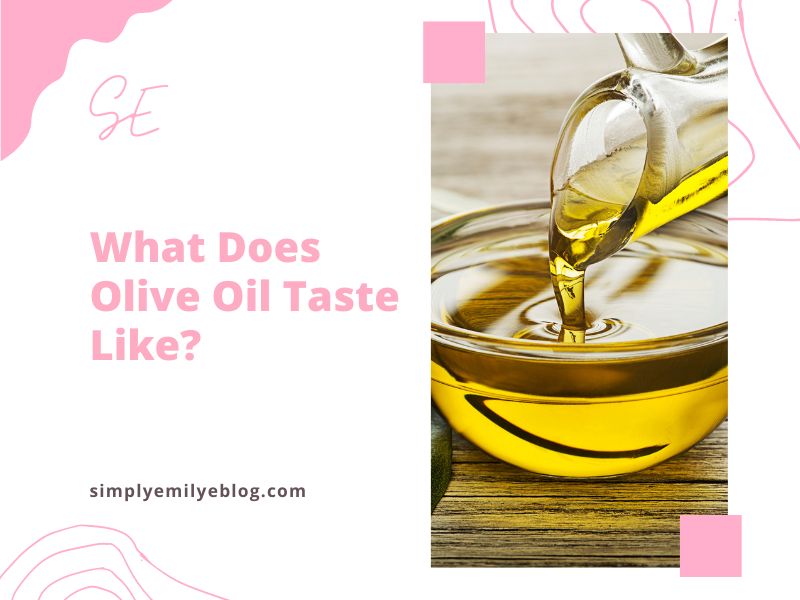Imagine a day filled with sunshine, a basket of fresh vegetables, and a table laden with dishes dressed in olive oil – my dream meal! I have enjoyed discovering the wonders of olive oil, even though it took me a while to appreciate what the fuss was about.
Through my many cooking adventures, I have found that the taste of olive oil is something truly remarkable – and worth the hype.
- The true character of olive oil
- What does real olive oil taste like?
- How would you describe the taste of olive oil?
- What contributes to the taste of olive oil?
- Is all olive oil the same?
- Can olive oil taste bitter?
- Does olive oil taste different from region to region?
- Is there a difference between green and ripe olives in terms of taste?
- Can I taste the difference between filtered and unfiltered olive oil?
- Can olive oil taste spicy or peppery?
- Does the age of olive oil affect its taste?
- Can I use olive oil in sweet dishes?
- How can I develop my palate for tasting olive oil?
- Can I use olive oil for cooking without altering its taste?
- How can I choose a high-quality olive oil?
My journey into the world of olive oil began many moons ago with a bottle of the plain, supermarket variety. Knowing it was good for me, I thought I may as well try it… but I was unimpressed. The flavour felt flat and boring; not something I wanted to be adding to my dishes. However, thanks to the powers of the internet, I very quickly learned there was much more to olive oil than what I could get from the grocery store.
The true character of olive oil
Armed with this knowledge, I set out to uncover the true character of olive oil. What I have since discovered is that even extra-virgin olive oil can have a remarkable range of flavours, depending on the variety and how it is processed. From the grassy, bitter pungency of unripe olives, to the summery, sweet sensations of ripened ones – and everything in between.
When you have an extra-virgin olive oil like the one we cold-press ourselves here, the flavour is so much more vibrant than what you would find in your average bottle from the store. For starters, there is that intense flavour of freshly mown grass, as if you’ve just stepped into a balmy Mediterranean field of olives.
This is accompanied by sweet notes that are so mouth-wateringly tempting, you can’t help but swoon. These tastes are present even before you take the first sip of the oil. When you do take a sip, you can expect to experience even more intense flavour.
| Olive Oil Type | Taste |
|---|---|
| Extra Virgin Olive Oil | Fruity, grassy, peppery, robust |
| Virgin Olive Oil | Mild, slightly fruity |
| Pure Olive Oil | Light, subtle, mild |
| Light Olive Oil | Neutral, minimal flavor |
| Cold-Pressed Olive Oil | Rich, full-bodied, aromatic |
| Organic Olive Oil | Similar to extra virgin, may vary |
| Flavored Olive Oil | Varies depending on added ingredients |
As you may already know, extra-virgin olive oil has a low smoke point, meaning it is best enjoyed uncooked in sauces and dressings. Once cooked, the delicate flavour will be lost. But that’s ok – uncooked, the gustatory potential of olive oil cannot be denied.
For a taste sensation to rival anything you’ll find in restaurants, you should try cold-pressed olive oil. Cold-pressed oil is typically made using unripened olives that are cold-pressed to extract their oil. This method causes minimal disruption to the delicate, grassy flavours of the olives. Additionally, the process does not involve any additives or chemicals, which makes for a more intense and flavourful oil.
The flavour of cold-pressed olive oil is like nothing else: it’s a blend of freshly mown grass, sweet garden fruits, and more subtle nuances that can be hard to describe. It’s thick, so it glides across your tongue slowly and delivers its flavour in waves. It can be slightly peppery, and has a delightful bitterness that lingers in the back of your throat.
For me, the flavour of cold-pressed olive oil is sublime. A flavour profile this complex is not something that can be created quickly. Stewing the olives, cold-pressed and extracting the oil – to me, this process is an art, and the flavour it gives is beautiful.
I’m a firm believer that once you’ve tasted cold-pressed olive oil, you’ll never want to go back. Store-bought varieties will never give you the same quality and flavour. To truly appreciate this unique taste sensation, nothing beats cold-pressed.
After all… The taste of olive oil can range from the grassy, bitter pungency of unripe olives, to the sweeter, more mellow flavours of those that have reached maturity – and everything in between.
The flavour of cold-pressed olive oil, however, trumps all of these. Its smoothness and rich flavour profile leaves a lasting impression that no store-bought option can ever hope to achieve. I love the taste of olive oil, and I highly recommend trying some for yourself.
Trust me, you won’t regret it.
What does real olive oil taste like?
Looking for a flavorful and healthful cooking oil? Look no further than natural, real extra virgin olive oil! While it may vary in taste strength, natural olive oil has a distinct flavor that cannot be mistaken.
As an experienced food blogger and an avid olive oil admirer, I’m here to tell you exactly what real olive oil tastes like, and the many ways it enhances my meals.
First things first: real olive oil has a zesty, smokey flavor that is both earthy and savory. I’ve used the term ‘real olive oil’ here, to distinguish it from imitation olive oils sold on the market.
Not all oils labelled ‘olive oil’ are derived from actual olives. Be sure to read the ingredient list and descriptions carefully to ensure that you’re getting the real deal – some extra virgin olive oils even have a Robustness Factor, which is a helpful hint as to its flavor strength.
I like to use extra-virgin olive oil for lighter-tasting dishes, and cold-pressed natural oils for when I want something heartier. Cold-pressed olive oils have more intense flavors, and are generally more expensive than extra-virgin.
When I smell extra-virgin olive oil, I think of the fresh fragrance of cut grass. I can detect the taste of grassy and floral notes with just a faint hint of pepper. It is worth noting that it can get stronger as it ages; green olives, with their lighter and milder taste, are used in the early stages of oil production and make for sweeter, lighter-tasting oils.
If you’re looking for something more intense and robust, I would suggest cold-pressed natural olive oil. It has a heavier, greener, and somewhat grassy aroma- you can feel the pepperiness of the oil even more in your mouth, but its intensity can vary from one brand to another. It is also less acidic and has a slightly bitter aftertaste. As you may expect, this oil is usually produced from more mature olives and tends to be more expensive than extra-virgin olive oil.
I regularly use extra-virgin and cold-pressed natural olive oil in my cooking. Some of my favorite dishes to make with the oils are slow-cooked stews and braised meats. The flavorful, earthy notes of the oils add a ton of depth and complexity to the dishes, which my family loves.

I also like to drizzle my salads and roasted veggies with extra-virgin olive oil. I love its delicate texture and its pleasant, zesty flavor. It’s the perfect complement to a light dinner.
When I’m feeling more adventurous, I even bake with olive oil. Believe it or not, the taste of olive oil in a loaf of bread or a batch of cookies can be quite magical. It gives the baked goods an earthy richness that you would normally only get from butter.
At the end of the day, the flavor of extra-virgin and cold-pressed natural olive oil really comes down to personal preference. No two oils will taste the same and some people prefer the milder flavor of extra-virgin olive oil while others might like the pungency of cold-pressed natural. Experiment with different types and brands to find a flavor that you like.
How would you describe the taste of olive oil?
Ah, the joy of savoring olive oil! Its taste is often described as fruity, grassy, and sometimes even peppery. The flavor can range from mild and buttery to robust and pungent, depending on factors such as the variety of olives used, the region of cultivation, and the production methods employed. Each sip or drizzle of olive oil offers a sensory journey that delights the palate.
What contributes to the taste of olive oil?
Several factors influence the taste of olive oil. The variety of olives used, including popular ones like Arbequina, Picual, and Koroneiki, plays a significant role. The ripeness of the olives at the time of harvest, the terroir of the olive grove, the climate, and the production methods employed all contribute to the unique flavor profile of the oil. Recently, I penned a fantastic article about Wendys coffee. Whenever you have some time, give it a read.
Is all olive oil the same?
No, not all olive oils are created equal. There are various types of olive oil, each with its own distinct taste. Extra virgin olive oil, the highest quality and most flavorful, is obtained through mechanical means without the use of heat or chemicals. Virgin olive oil, refined olive oil, and olive pomace oil have different taste profiles due to variations in processing methods and quality.
Can olive oil taste bitter?
Yes, bitterness can be a characteristic of high-quality olive oil. Some olive varieties, especially those harvested early in the season, may possess a bitter note. Bitterness in olive oil can be a desirable trait that adds complexity and depth to the overall flavor profile.
Does olive oil taste different from region to region?
Absolutely! Olive oil showcases the terroir of the region in which the olives are grown. Just like wine, olive oil exhibits variations in taste based on the specific climate, soil composition, and unique growing conditions of different regions. You can embark on a gustatory adventure by exploring olive oils from different regions and discovering the diverse flavors they offer.
Is there a difference between green and ripe olives in terms of taste?
Yes, the ripeness of olives at the time of harvest affects the taste of olive oil. Green olives, harvested earlier in the season, tend to produce oil with a more robust and grassy flavor. Ripe olives, on the other hand, offer a milder and fruitier taste. The choice between green and ripe olive oil depends on personal preference and the desired flavor profile in your culinary creations.
Can I taste the difference between filtered and unfiltered olive oil?
Indeed, the filtration process can influence the taste of olive oil. Filtered olive oil tends to have a smoother and more refined flavor, as it removes any sediment or particles. Unfiltered olive oil, sometimes referred to as “cloudy” or “cold-pressed,” may retain more of the olive fruit particles, resulting in a slightly thicker texture and a more pronounced flavor.
Can olive oil taste spicy or peppery?
A peppery or spicy sensation in olive oil is often a sign of high-quality oil. It is caused by the presence of phenolic compounds, such as oleocanthal, which contribute to the pungency and throat-catching sensation. The intensity of the peppery taste can vary, with some oils having a gentle tickle and others providing a more robust kick.
Does the age of olive oil affect its taste?
Yes, the age of olive oil can impact its taste. Freshly pressed olive oil tends to have a vibrant and robust flavor profile. Over time, the flavors may mellow and evolve, resulting in a smoother but potentially less intense taste. It’s generally recommended to consume olive oil within its shelf life to fully experience its fresh and vibrant flavors.
I’ve written an amazing article that discusses the calories in rice and beans. Take a peek whenever you get the chance.
Can I use olive oil in sweet dishes?
Certainly! While olive oil is often associated with savory dishes, it can be a delightful addition to sweet creations as well. The fruity and grassy notes of olive oil can complement desserts, especially those with citrus or fruit components. Drizzling a high-quality olive oil over vanilla ice cream or incorporating it into cakes and cookies can add a unique and unexpected flavor dimension.
How can I develop my palate for tasting olive oil?
To refine your palate for olive oil, practice mindful tasting. Start by choosing a variety of olive oils and sample them side by side. Pay attention to the flavors, aromas, and textures, noting the differences between each oil. Take small sips or drizzles and allow the oil to coat your palate, focusing on the sensations it evokes. With time and experience, your taste buds will become more attuned to the subtleties of olive oil.
Can I use olive oil for cooking without altering its taste?
Cooking with olive oil can enhance the flavors of your dishes, but it’s important to consider the smoke point of the oil. Different grades of olive oil have varying smoke points, with extra virgin olive oil having a lower smoke point than refined olive oil. To preserve the delicate flavors of extra virgin olive oil, it’s best used in low to medium heat cooking or as a finishing drizzle.
Can I substitute olive oil with other oils in recipes? Yes, olive oil can often be substituted with other oils in recipes. However, keep in mind that the taste profile may change. Each oil has its own distinct flavors, so choosing a substitute will depend on the desired outcome of the dish. For example, if a recipe calls for extra virgin olive oil and you prefer a milder taste, you might opt for a neutral oil like grapeseed or avocado oil.
How can I choose a high-quality olive oil?
Selecting a high-quality olive oil requires attention to detail. Look for oils labeled as “extra virgin,” as they undergo minimal processing and retain the most natural flavors. Consider reputable brands and look for certifications or awards that indicate the oil’s quality. Lastly, trust your taste buds. If an olive oil tastes fresh, vibrant, and free from any off-flavors, you’ve likely found a gem.




